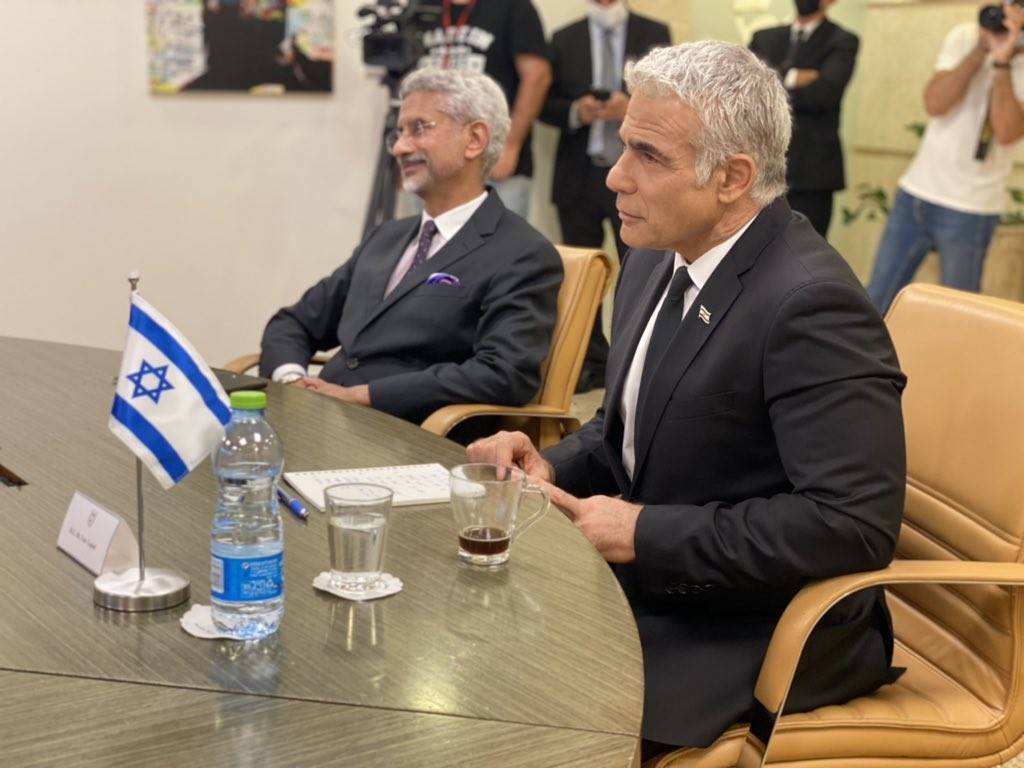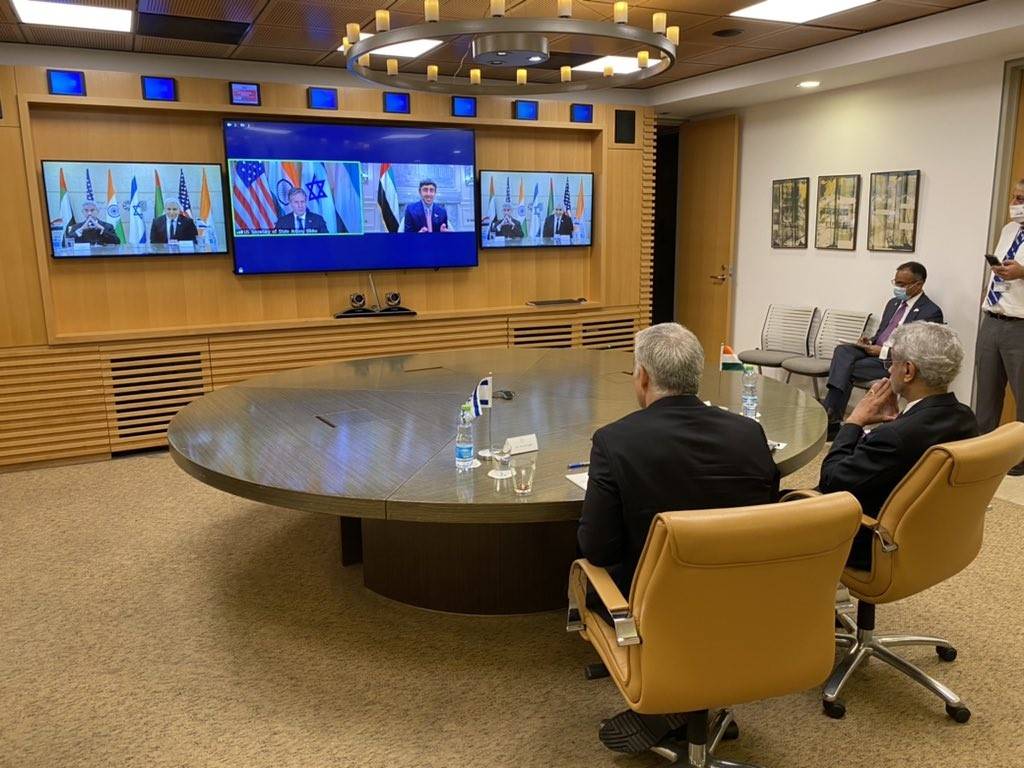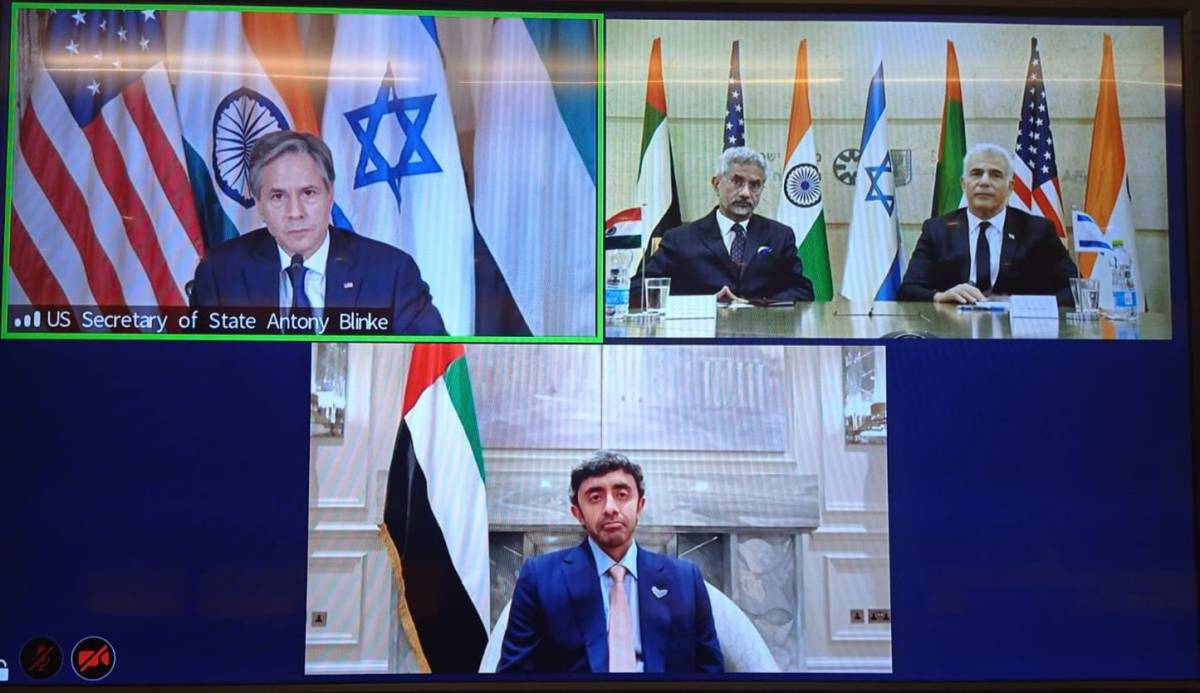The four top diplomats discussed “future opportunities for collaboration in the region and globally”, as well as maritime security, reports Arul Louis
The foreign policy leaders of India, the US, Israel and the United Arab Emirates (UAE) held a virtual ministerial meeting for what could have the makings of a grouping in the Middle East similar to the Quad, but with a more limited security agenda.
“Discussed working together more closely on economic growth and global issues. Agreed on expeditious follow-up,” India’s External Affairs Minister S. Jaishankar tweeted after the meeting on Monday with US Secretary of State Antony Blinken and Foreign Ministers Yair Lapid of Israel and Sheikh Abdullah bin Zayed of the UAE.
Jaishankar, who is currently on a visit to Israel, was seated next to Lapid during the virtual meeting.
The four top diplomats discussed “future opportunities for collaboration in the region and globally”, as well as maritime security, said a statement from State Department spokesperson Ned Price.

They also discussed “expanding economic and political cooperation in the Middle East and Asia, including through trade”, the statement added.
Earlier at his daily briefing in Washington, Price said: “Obviously this is a collection of four countries — the US, the UAE, Israel and India — with whom we share many interests.”
India has close relations with all three countries.
In a kaleidoscopic strategic environment where China stretches its sphere of action from the Indo-Pacific on the East to the West and beyond, India is situated in the middle of the Indian Ocean with its sea borders opening to the two areas can bridge them in association with the US.
After the US pulled out its troops from Afghanistan, China, which borders that country, is exerting its influence there with an eye on projecting its power beyond.
But unlike in the Indo-Pacific, where the Quad sees Beijing as the overarching threat, India is likely to be a restraining force on a possible Middle Eastern “Quad” making it less likely to get too deep into local rivalries, but focusing instead on cooperation in critical areas energy, health, economics and climate change.
US President Joe Biden and Prime Minister Narendra Modi of India and Scott Morrison of Australia and the then-prime minister of Japan, Yoshihide Suga, held a summit in Washington last month at which they committed themselves “to bolster security and prosperity, in the Indo-Pacific and beyonda, giving an opening for moves further afield”.
The Quad bills itself as a group of democracies “committed to building democratic resilience in the Indo-Pacific and beyond, but that does apply to the Middle East-oriented group, which includes the UAE, an amalgam of non-democratic monarchies”.
Price’s statement on the Middle East meeting avoided mentioning democracy, showing the limits to Washington’s vociferous declarations about it.
The US statement on the meeting makes no mention of security issues beyond a passing mention of “maritime security” and it is also regional tensions.
The Quad summit’s statement, though, said that “regional security has become ever-more complex, testing all of our countries individually and together”, a reference to China without naming it and added: “We recommit to promoting the free, open, rules-based order, rooted in international law and undaunted by coercion, to bolster security and prosperity in the Indo-Pacific and beyond.”
The Quad has been steadfast in avoiding being labelled a security alliance, instead focusing its outward-looking action agenda on matters like jointly providing Covid-19 vaccines around the Indo-Pacific and cooperating on climate change.
The Middle East meeting statement also emphasised climate change and Covid-19. And a common thread in both was “people to people ties in technology and science”.
The members of the Quad participate in joint military exercises and India hosted the second phase of the Malabar Exercise of the four navies last week.
The US and India extended their joint naval exercises to the other side of the Indian Ocean in 2019 with anti-submarine drills near Diego Garcia.
The four countries in the Middle East, have not held joint military exercises, but India participates in separate exercises with Israel and the UAE.
It is participating in the Israeli Blue Flag Exercise of air forces that began on Sunday alongside the US, the UK, Germany, Italy, France and Greece.
India and the UAE conducted a naval exercise off the coast of Abu Dhabi in August.

In a cooperative set-up of the four nations focused on the Middle East, the UAE has the capital and Israel and the US the technology edge and India the manufacturing and execution capability.
The geopolitical situation in the Middle East is, however, a web of complexities and some interdependencies.
The UAE is a close ally of Saudi Arabia, a leading regional powerhouse, which is not involved in the Middle East initiative and does not have diplomatic relations with Israel.
But inevitably, any cooperation of the four countries would seem to include Saudi Arabia as the unseen guest.
The UAE and Saudi Arabia have a measure of hostility towards Qatar, having even gone through a phase of cutting off diplomatic ties with Doha and even imposing an embargo on it over allegations that it was supporting terrorists.
Israel, too, has had similar complaints about Qatar.
The conflict in Yemen sees the UAE and Saudi Arabia ranged on one side supporting the government there, while Qatar and Iran are backing the Houthi rebels in the ongoing civil war.
And there is the Turkey factor: Ankara is trying to emerge as a rival centre of political Islam reclaiming the pre-World War I role as the Caliphate.
Then there are the conflicts in the region like in Syria, which is supported by Russia and Iran, but opposed by the US and Saudi Arabia, and Libya.
India has stayed aloof of the conflicts trying to maintain some neutrality keeping bridges to Iran, Qatar and Iran.

Leave a Reply